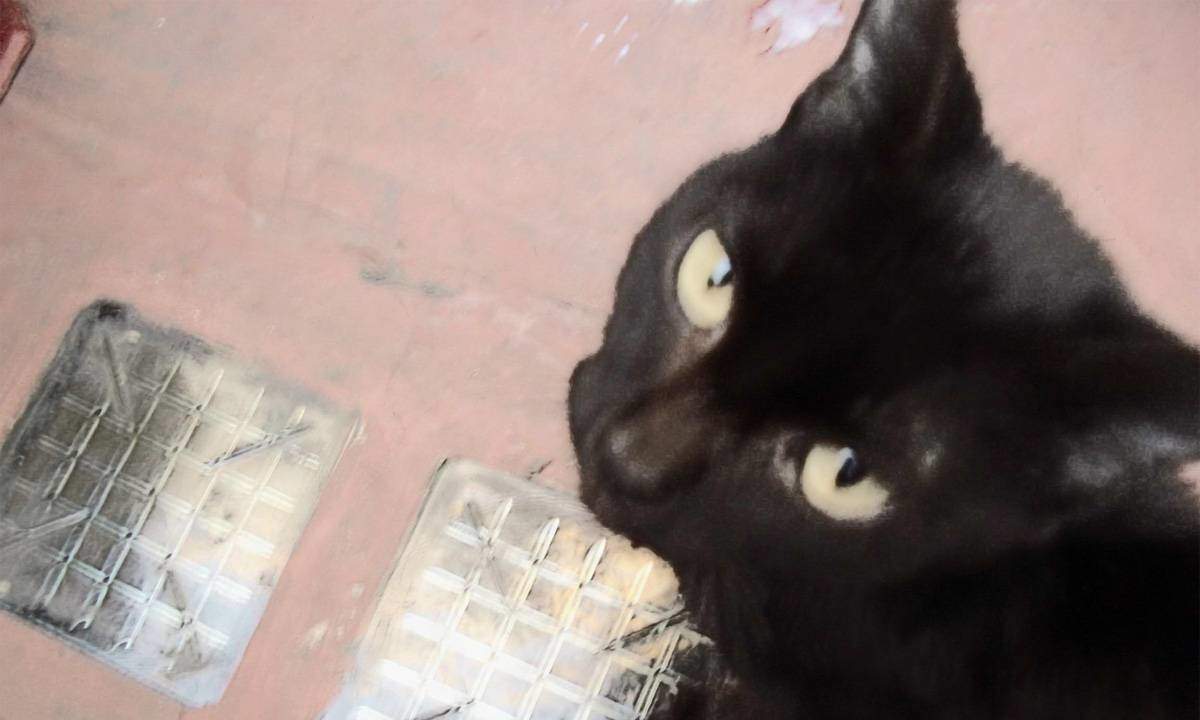Like many people in the fall of 2015, we found ourselves under the spell of a heatwave. A number of us had rented a four-bedroom palapa for a few days, up a hill from the beach town of San Augustinillo, in Mexico’s Oaxaca state. It had no air conditioning. By mid-morning each day, we’d make our way down to a modest open-air restaurant on the beach, spend the afternoon in its umbrella’d lounge chairs, then head back up as the sun finally began to let up.
At the tail end of one of these days, my boyfriend and I decided to walk home along the coily road, as opposed to our usual route up the narrow path through the woods. Just past the village, the road ran almost all uphill. We were well on our way to exhausting ourselves when we came across a dog who was mildly interested in greeting us. We could see his ribs, but aside from a propensity to lie down in the road, he seemed like for the moment he was getting along. There was a house right across the road; it was within the realm of possibility that he lived there.
Even though the dog seemed very hungry, I did not climb back down the hill with some food for him. In fact, I mostly forgot about him until some point during the hour-long taxi ride to the airport the next day, when someone in the group mentioned that on the walk back to the house, they’d come across a dying dog at the side of the road. How did they know it was dying? Because it was just lying there wheezing, in a death rattle kind of way. My boyfriend and I don’t exactly know it was the same dog. But we know that it was the same dog. Sometimes animals make a last ditch effort, and we were probably his. During the remainder of that car ride, through the wait at the airport and the flight itself, the recollection of the dog hung on me.
I open with this story because it is recent and therefore still on my mind, but more so because it brings back to mind another story from a long time ago.
In 2005, during a three-month stay in Buenos Aires with my then-boyfriend, we rented an enormous loft in El Centro, an area that was bustling during the week and eerily empty on the weekends. On one Sunday, we took a walk in the direction of the only video rental store that was willing to rent movies to a couple of foreigners, a mile or so away. On the way we found a kitten propped against the closed front door of a building. She was black, with yellow eyes that were only half open as they regarded us. We kept on going but as we walked agreed that if she was still there on our way back, we’d help her. At the video rental store, we rented Heat. In Argentina it was called Fuego Contra Fuego (“Fire Against Fire”).
The kitten hadn’t moved at all and looking at her this time it was clear that she was starving to death. If no one intervened, here was her last couple of hours on earth.
We left her there for another few minutes, found an open grocery store, and returned to her with some cat food. She wouldn’t or couldn’t get up to come get the food, but if we held it right in front of her mouth, she’d eat it. We gave her some water. We found a box, I don’t remember from where, we got her into it and, this part I remember, carried her home in it. She, passively accepting whatever this was.
We placed the box on the terrace and left her with some food and water and wondered if she’d still be alive the next morning.
After two or three days, she’d gained some strength and if we took her out of the box, would wander gingerly around the loft. After a week, the box was no longer an obstacle. At her full strength, a personality was beginning to emerge. Her butt waddled when she ran. She purred louder than any other cat I’ve known. A couple weeks more and she’d convinced us to let her on the bed.
We never locked her in. She could have left on her cat adventures but instead she was always there when we came home.
We didn’t name her. I was 26 years old and utterly unsettled and planning to travel Europe the following summer. And anyway bringing a cat to the US from Argentina was complicated.
These facts of my convenience, of course, did nothing to mitigate the other fact of there being way too many cats in Buenos Aires, making the securing of her care there close to unworkable. I had trouble tracking down reliable numbers, but suffice to say that in 2005, the city had not figured out a way to get the problem under control. Every time we asked someone if they knew anyone who might want a cat, we were met with a sympathetic chuckle.



There is a park in Buenos Aires where people often leave their unwanted cats. We considered putting her there, knowing that an organized brigade of volunteers would see to her basic needs. But then, one person responded positively to our inquiries.
Next door to our building was a diner that we ate in four or so times a week. It was a working man’s diner and we were a novelty there. We’d become friendly with the owner, who liked to practice his English on us and already kept one cat to keep the mice at bay. He’d be happy to take our black kitten. With only a few weeks left the smartest way forward seemed to be to go ahead and move her into the diner, then to visit her every day, which I did.
The owner of the diner named her Macarena. To us, a bad pop song. To him, a name he liked the sound of. Macarena didn’t take to the place immediately, hiding upstairs in the storage room, out of which I was the only person who could coax her. I came at every lunch hour to eat my own meal and to feed her one as well. We sat at the table in the back, right by the stairs to the storage room, and I fed her by hand.
One night as we walked home to the loft, we passed the closed diner. We cupped our hands to our faces and peered through the glass, on the other side of which Macarena was hanging around on the counter with the other cat. This was a big moment. Macarena was adjusting. We could leave her in the diner without too much guilt. It wouldn’t be as good a life as she’d had with us in the loft, but if would be good enough. We had succeeded in saving her, we figured.
Off we went to New York and then to London and then so on and so forth.
Three years later, we returned to Buenos Aires. This time we stayed in a different neighborhood and rarely made it to El Centro. I was planning a trip to the diner to visit Macarena, of course, and when I began to put the plan into action my then-boyfriend told me to stop. He’d already gone to the diner, he said, on a day I’d been doing something else. Next, pursed lips formed a pregnant pause. When he ended it, I’d learn that Macarena had eaten rat poison six months before, and it killed her.
I’m sure there are people out there, types who court confrontation on the regular, yes, but also those who can’t stand to not have all the answers, who would have gone through with the plan to head to the diner, armed with this information as it was still being absorbed, to ask the owner what happened, and please, in detail. Instead, I avoided the street we’d lived on altogether and with intensity. Once, on a Sunday when I knew it would be closed, I glanced at the diner from the corner and moved quickly along.
The owner had been kind to take the cat in, but cavalier in his care for her. Had he ever been cruel, though? More importantly, had I? And do cultural norms come into play in determining that? Or can cruelty be measured by some universal system?
I do the math sometimes. Macarena had three or so years of life. Eight or so percent of that life was spent with us in the loft. In total, she had 70 percent less life than she could have reasonably expected. Two-thirds of this life probably qualified as acceptably contented. These numbers quantify certain things, but they fail to measure the parts about guilt and shame and self-loathing and self-rationalization that in sum comprise the hard-to-unpack emotion that I feel today whenever I think about this story.
Macarena could have run away from the diner any time she wanted; its front doors were open all day long. She never did, a small but legitimate consolation, and a fact that must figure into the above math.
She did the best she could, people often say of mothers who provided less than perfect childhoods to their offspring. This statement is simultaneously praise and insult. It suggests genuine effort and earnest good intentions, but is never said of a person without many flaws or a terrible set of circumstances, or both. She did the best she could. The unspoken addendum being: which is not nearly as good as many others would have done.
With Macarena, I did the best I could. It rings hollow, no?
Today, it is most often my seven pound mutt of a dog that makes me think of Macarena, particularly in moments when I am very good to her, my dog. The thought inevitability flashes like worn-out neon, that I could have done the same very good type of thing for Macarena, had I so chosen. That thought in due course inevitably leads me to question how much of a choice it had been. It’s obvious that this line of thought, uncontrolled, will lead toward those philosophical questions that, because they are not answerable, keep humanities programs afloat in perpetuity (one would think).
Nonetheless, I sometimes have concluded that I did have a choice, and that I had been cruel. Other times, I conclude that the initial kindness of saving the kitten compensates for the later failure to do so.
As I write this essay, I’m looking out the window above my desk at a little sparrow in the backyard that appears to maybe be hurt. An hour ago, I chased the cat from next door away from it. I put a little dish of water out for it. There is nothing else I can do that I know of. The sparrow hops around but doesn’t fly away.
In the moments between the last sentence and this one, the cat from the house on the other side of us leaped into the yard, caught the bird after the briefest of chases, and hopped with it in its mouth back over the fence as I stood, pounding stupidly on the window. And so life goes, and so it ends, that of one cat and that of a hapless sparrow, that of another cat in Argentina and that of a dog on a road in Mexico. And there’s the echo; She did the best she could.






